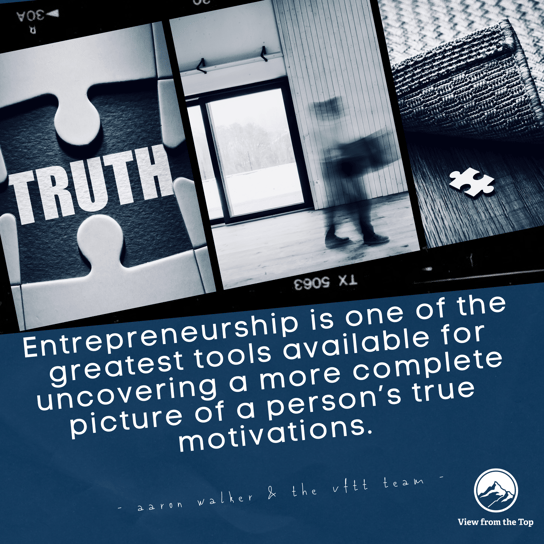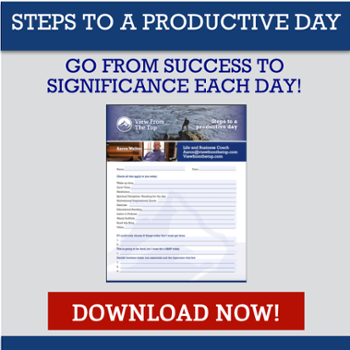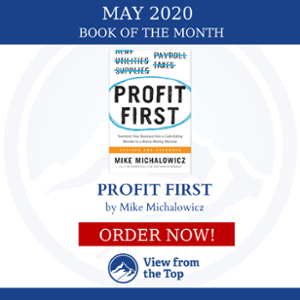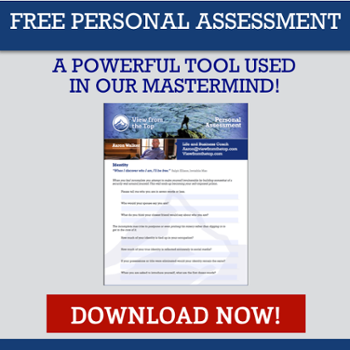
Would you like to know one of the most difficult truths about being an entrepreneur? I hope you’re ready for this, because you’ve probably heard it elsewhere. But this could be the time it finally sinks in. Entrepreneurship is one of the greatest tools available for uncovering a more complete picture of a person’s true motivations.
Quite often, as a Christian life coach, I’ve run into a problem my friend Brian Moran talks about in his book, The 12-Week Year. (This book is so good, we made it the official time management tool for our online mastermind groups).
The problem is people are genuinely unaware of what motivates them.
All kinds of people try to go into business for themselves. If they were honest about some of the things that drive them, they’d back off and undergo the process of “cleaning house” inside. Sadly, many of them are already in business and generating cash flow, long before we figure this out. It sometimes falls to me, as the business coach, to notice it.
STATED VS HIDDEN INTENTIONS
Brian describes “stated intentions” as the “surface reasons” we give for wanting to do something. The most common one you’ll hear around January 2nd of each year is “I want to lose weight.” There’s nothing wrong with that. It’s a socially acceptable desire. We have all kinds of cultural and scientific studies, articles and news stories to back it up as a good thing to do for ourselves and our families.
But those aren’t always the hidden intentions, not by a country mile. You don’t want to lose weight for its own sake. Usually, there are reasons far more meaningful to each individual. They may not be wise at all, but they’re no less important to the particular person. Some of them are genuinely good, such as achieving a high degree of physical health. Others can stem more from insecurity, such as a desire to be perceived a certain way by others.
 Brian says the stated and hidden categories of intention can be compared to an iceberg floating in the ocean. The “stated” intentions represent the top of the iceberg, the part those lookouts on the Titanic spotted a little too late before it struck the hull.
Brian says the stated and hidden categories of intention can be compared to an iceberg floating in the ocean. The “stated” intentions represent the top of the iceberg, the part those lookouts on the Titanic spotted a little too late before it struck the hull.
But the “hidden” intentions correspond to much larger, invisible parts of the iceberg - usually 80 or more percent of it. These reasons are naturally much stronger, and they hold the advantages of size and speed in getting us to respond.
TITANIC COMMITMENTS
In our mastermind groups, it’s common to encounter hidden intentions, and we’re not talking about “wolves in sheep’s clothing” reasons. I wouldn’t describe a single member of our groups that way; these are sincere, devoted, godly entrepreneurs with families they love. But sometimes, it’s easier to pull teeth than to get a firm commitment to change. And I believe one reason for this is hidden intentions.
The mastermind business, however, is meant to tackle these issues head-on. Part of what clouds an entrepreneur’s judgment in trying to overcome these issues is too many other competing issues on the plate.
You might be surprised to learn that we’ve found The 12-Week Year helpful in rearranging their priorities. It turns out, they can work through upper limit challenges and poor beliefs about themselves - when they have permission to slow down in other areas.
We’ve seen breakthrough when members are willing to suspend their way of doing things long enough to make changes inside of 12 weeks. With most challenges, this can be done, if the person doing them can take the risk that their family, business and other concerns will not get swept out to sea as a result. We also don’t ask them to wholeheartedly neglect anything else; we only recommend they concentrate the majority of their energy on their top two to three priorities.
COMMITMENT BUILDING BLOCKS
With those priorities outlined, Brian says we next need to identify “keystone” actions. These have the greatest overall impact, and will move us in the direction we want to go. Ordinarily, these actions seem impossible, because our judgment is clouded by too many distractions. But remember, at this point, we’re now dialed in to our top priorities. We’re committed to not work on anything else until we’ve resolved or achieved significant progress with them.
Each keystone action also has a cost, in case you didn’t know. As the old saying goes, “Everytime you say ‘Yes’ to one thing, you say ‘No’ to something else.” I want you to be prepared to say “no,” for a season - not forever - to something you’d ordinarily agree to.
If you hide from sales calls by doing accounting, product development or excessive planning … one or more of those categories needs a break. If you normally eat a lot of fried or processed foods, and you need to lose excess body fat … you commit in writing to cut those things out.
COMMITTING BEFORE YOUR MASTERMIND
 There’s a reward waiting for you when you begin to arrange your life and business this way. Particularly if you do this in the presence of your mastermind online, and then achieve it - you won’t believe the fire it’ll light with others. A healthy marriage, a smaller waist size, a larger bank account, a dream come true - all of these things require work that’s much more mental than physical.
There’s a reward waiting for you when you begin to arrange your life and business this way. Particularly if you do this in the presence of your mastermind online, and then achieve it - you won’t believe the fire it’ll light with others. A healthy marriage, a smaller waist size, a larger bank account, a dream come true - all of these things require work that’s much more mental than physical.
Strong as our brains are, neuroscience confirms that they too are like icebergs of intention. The subconscious mind is fast, loud, strong and aggressive. Unless we choose to exercise the prefrontal cortex, the part of our brain that makes logical and rational decisions, our deep-seated emotional side will take over naturally.
But mastermind groups online put your subconscious at a disadvantage! See, one thing about our subconscious is that it acts on instinct, like an animal’s brain. It thinks about satisfying impulses and emotions. It doesn’t use a lot of logic, and gets us in trouble quickly because it doesn’t do well with complicated thinking and waiting.
When you team up your prefrontal cortex with eight to ten other people’s prefrontal cortexes, your subconscious faces a much stronger opponent. It can overwhelm you when you’re by yourself. But when you’re committed to being authentic, transparent and vulnerable with a board of trusted advisors? Now your subconscious has to contend with too many strong, intelligent and thoughtful minds. It makes the decision to follow advice and counsel so much easier.
Maybe this is the right time for me to mention, we’re looking for a few good “prefrontal cortexes” for our Iron Sharpens Iron mastermind groups. I encourage you to apply, using this link.





